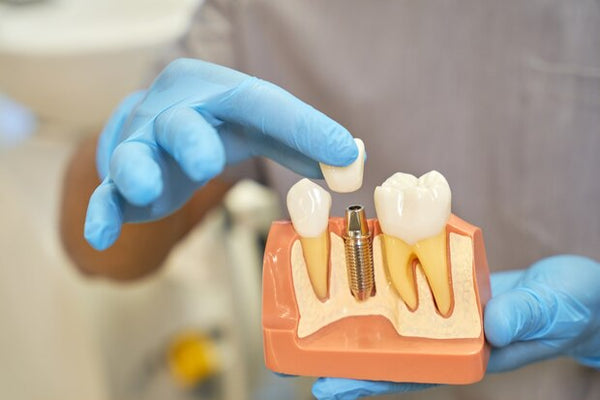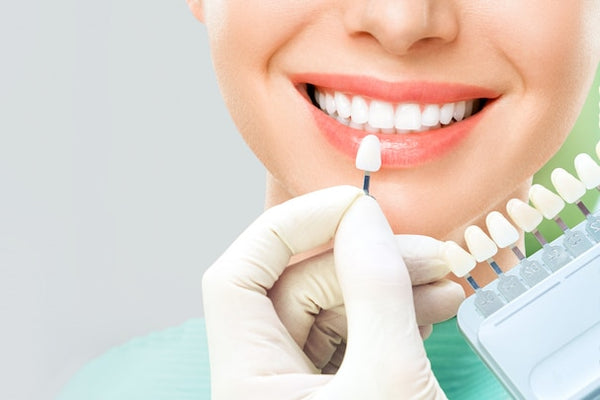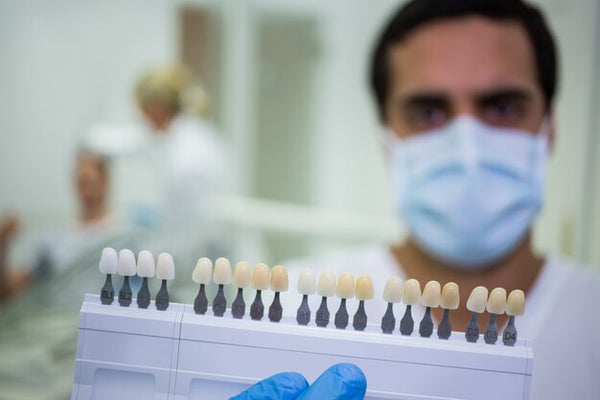
Is It Worth Getting A Dental Crown On Your Tooth?
Is It Worth Getting A Dental Crown On Your Tooth?
Dental crowns are a popular dental treatment that can be used for many reasons, from improving your smile to protecting your oral health. To start, let's take a moment to explain what dental crowns are. A dental crown is a custom-made cap that is put over a tooth that is broken or decayed to fix its shape, strength, and look. There are different materials for these crowns, each good for a certain job. They can be very helpful for a lot of various tooth problems.
Our aim here is to guide you through the decision-making process by providing insights into the world of dental crowns. We understand that choosing whether to invest in a dental crown involves carefully considering various factors. This blog is your go-to resource for understanding the intricacies of dental crowns and determining whether they align with your dental needs and preferences. We want to give you the power of information by giving you a complete picture of the process, its benefits, and the things you should think about before proceeding.
Let's go on this journey together, looking into whether getting a dental crown on your tooth is worth it and giving you the information you need to make a good choice for your oral health.

Understanding Dental Crowns
Dental crowns are a flexible and effective way to fix problems with teeth like damage, decay, or weak structures and impactful solutions within restorative dentistry. At its core, a dental crown is a carefully made prosthetic cap meant to cover a damaged tooth. This custom-made cap, sometimes called a "tooth cap" is made from porcelain, clay, or metal so it blends in perfectly with the natural teeth. Accurate measures and molds are taken during the process to make sure that the crown fits perfectly over the damaged tooth.
A dental crown works as a shield to protect the tooth and restore its shape, size, and general health. It fixes many oral problems and looks good simultaneously, making it an essential part of modern restorative dentistry.
The Functions of Dental Crowns
- Structural Restoration
One of the primary functions of dental crowns is restoring a compromised tooth's structure. Whether a tooth has experienced decay or trauma, the crown serves as a durable and resilient covering, preventing further deterioration while restoring the tooth to its original form.
- Strength and Protection
Dental crowns go beyond cosmetic enhancements, providing essential strength and protection to weakened teeth. When a tooth is at risk of fractures or has undergone significant dental work like a root canal, a crown becomes a vital safeguard, ensuring the tooth's longevity and durability.
- Cosmetic Improvement
Beyond their structural roles, dental crowns contribute to the cosmetic enhancement of the smile. Discolored, misshapen, or poorly aligned teeth can be transformed, creating a natural and aesthetically pleasing appearance. This dual functionality makes crowns popular for those seeking oral health restoration and cosmetic improvement.
- Support for Dental Bridges
Dental crowns are pivotal in supporting dental bridges, which replace missing teeth. By capping adjacent healthy teeth, crowns provide strength and stability for the bridge, ensuring a balanced and functional dental arch.
- Integration with Implants
If you use dental implants to replace lost teeth, you can see the dental cap that goes over the implant base. This not only replaces the lost tooth, but it also fits in perfectly with the other teeth around it.
Different Types of Dental Crowns Available
- Porcelain Crowns
Known for their natural appearance, porcelain crowns are an excellent choice for front teeth. They mimic the translucency and color of natural teeth, making them a popular option for cosmetic restorations.
- Metal Crowns
Metal crowns, often made from alloys like gold or silver, are renowned for their durability and strength. While not as aesthetically pleasing as porcelain, they are usually recommended for molars whose sturdiness is paramount.
- Porcelain-Fused-to-Metal (PFM) Crowns
Combining metal's strength with porcelain's aesthetics, PFM crowns strike a balance. They are suitable for both front and back teeth, providing durability with a natural appearance.
- All-Ceramic Crowns
These crowns are entirely made of ceramic materials, offering excellent aesthetics and biocompatibility. They are often chosen for their ability to blend seamlessly with natural teeth.

When deciding if getting a dental crown is worth it, it's essential to consider the different types out there. Which of these types to choose relies on things like where the damaged tooth is located, how you want it to look, and your specific useful needs. By learning about the different types of dental crowns and how they work, you can make an educated choice that fits your oral needs and tastes.
Common Dental Issues Necessitating Crowns
If you're considering getting a dental crown, knowing what kinds of tooth problems usually require this kind of repair is essential. Let's look at the different situations in which dental crowns are very helpful in fixing oral issues. This will help you decide if getting a dental crown is worth it for you.
Tooth Decay
Tooth decay is a common dental problem that can damage the tooth's structure. A dental crown is a good choice when the widespread damage threatens the tooth's structure. The crown gives the tooth a protected covering that stops further damage and restores its health and function. When you get a dental crown for a damaged tooth, you're not only fixing the problem right away, but you're also protecting the tooth's health in the long run.
Cracked or Chipped Teeth
Accidents, injuries, or even biting down on something hard can result in cracked or chipped teeth. These structural damages not only affect the tooth's appearance but also compromise its strength. Dental crowns offer a comprehensive solution by encapsulating the damaged tooth, providing aesthetic restoration and crucial reinforcement. The crown serves as a durable shield, preventing further damage and preserving the tooth's natural function.
Protection after a Root Canal
While essential for addressing infected or inflamed tooth pulp, a root canal procedure can leave the tooth more vulnerable to fractures. To safeguard the treated tooth, a dental crown is often recommended. The crown adds an extra layer of protection, preventing any potential damage and ensuring the success of the root canal treatment. This preventive measure post-root canal is instrumental in maintaining the tooth's health over time.
Cosmetic Improvements
Dental crowns are not solely reserved for functional issues but are equally valuable in cosmetic dentistry. For individuals seeking to enhance the appearance of their smile, crowns can address a range of cosmetic imperfections. Whether discolored, misaligned, or irregularly shaped, crowns offer a versatile solution for achieving a natural and aesthetically pleasing smile. The decision to invest in a crown for cosmetic improvements is often personal, balancing both the desire for an enhanced appearance and the restoration of oral health.
In weighing the worthiness of getting a dental crown, evaluating your specific dental concerns in the context of these common issues provides valuable insight. Whether it's decay, structural damage, post-treatment protection, or cosmetic considerations, dental crowns offer a versatile and comprehensive solution. Pursuing a dental crown should align with your immediate needs and long-term oral health goals.
Benefits of Dental Crowns
Considering the decision to invest in a dental temporary crown prompts a closer look at the numerous benefits this versatile dental solution brings to the table. From protection and reinforcement to aesthetic restoration, dental crowns offer a range of advantages that may make them worth considering for your specific dental needs.
Protection Post-Root Canal: After undergoing a root canal procedure, a tooth may become more vulnerable to fractures. Dental crowns offer essential protection by covering and reinforcing the treated tooth. This preventive measure ensures the success of the root canal treatment and maintains the tooth's health over the long term.
Customization for a Natural Look: Dental crowns are custom-made to match the color, shape, and size of your natural teeth. This level of customization ensures a seamless integration with the rest of your smile, making the cap look almost exactly like the teeth around it.

Comfort and Stability for Dental Bridges: Dental crowns serve as stable anchors for dental bridges that replace missing teeth. Crowns provide essential support by capping adjacent healthy teeth, ensuring the bridge remains secure and functional. This contributes to both comfort and stability when replacing missing teeth.
Preservation of Tooth Structure: When a tooth has a large filling or has undergone extensive decay, the structure may be compromised. Dental crowns not only restore the tooth's form but also help preserve its remaining structure. This proactive approach minimizes the risk of further damage and potential tooth loss.
Resistance to Staining and Wear: Certain materials used in dental crowns, such as porcelain, are resistant to staining. This property helps maintain the crown's aesthetic appeal over time. Additionally, crowns can withstand the wear and tear associated with regular oral functions, providing a durable and effective solution.
Ease of Maintenance: Caring for dental crowns is relatively straightforward and aligns with regular oral hygiene practices. Brushing, flossing, and routine dental check-ups are essential for maintaining the health of the crown and surrounding teeth. Following these practices ensures the longevity and effectiveness of the dental crown.
Improved Speech and Chewing: Dental crowns, by restoring the shape and function of compromised teeth, contribute to improved speech and chewing abilities. This is especially significant for individuals with dental issues affecting their bite or speech patterns, providing functional and quality-of-life improvements.
Considerations Before Getting a Dental Crown
Before deciding to get a dental permanent crown, it's essential to consider several factors that can influence the overall experience and outcome of the procedure. Considering these considerations can help you determine whether the investment in a dental crown aligns with your priorities and expectations.

Cost Factors
When thinking about getting a dental crown, the cost is an important thing to think about. The cost of the procedure can vary based on factors such as the material used for the crown, the complexity of the dental issue, and the geographic location of the dental practice.
Finding out how much it will cost and seeing if your dentist's insurance covers it can help you decide if the cost fits into your budget. It may seem like a significant investment at first, but it's essential to compare it to the long-term benefits and stability of the dental crown.
Time Commitment for the Dental Crown Procedure
Getting a dental crown is a multi-step process that involves an initial consultation, tooth preparation, crown fabrication, and the final placement of the crown. The overall time commitment for this procedure can vary. Some crowns may be placed in a single appointment using advanced technologies like same-day crowns, while others may require multiple visits.
Understanding the time required for each process step is crucial, especially for individuals with busy schedules. Additionally, being aware of any necessary follow-up appointments or adjustments is essential for a comprehensive timeline.
Potential Discomfort or Sensitivity Post-Procedure
It's common for individuals to experience some discomfort or sensitivity after getting a dental crown. The tooth may be sensitive to hot or cold temperatures, and mild discomfort might occur during the initial adjustment period. While these issues often subside quickly, it's essential to be prepared for potential post-procedure sensations. Communicating openly with your dentist about any discomfort ensures that appropriate measures can be taken to address and alleviate concerns.
When deciding if getting a dental crown is worth it, considering these things gives you a more complete picture. The general decision-making process considers the cash investment, the time needed, and the possible experiences after the operation. If you think about these things beforehand, you can make an informed decision that fits your personal tastes and oral health goals.
Risks and Potential Complications
While dental crown cement are generally considered a safe and effective solution for various dental issues, it's essential to be aware of potential risks and complications. Understanding these aspects can help you decide whether getting a dental crown is the right choice for your unique circumstances.
Allergic Reactions to Materials
Dental crowns can be crafted from various materials, including porcelain, ceramic, metal, or a combination. While these materials are chosen for their biocompatibility, there is a rare possibility of allergic reactions in some individuals. It's important to discuss any known allergies or sensitivities with your dentist during the consultation phase. If someone is known to be allergic, different materials may be used to lower the risk of bad responses. Open communication with your dental care team is key to selecting materials that align with your health and well-being.
Sensitivity Issues
Post-procedure sensitivity is a common occurrence with dental crowns. Some individuals may experience heightened sensitivity to hot or cold temperatures, especially immediately after the crown placement. While this sensitivity often diminishes over time, it's essential to communicate any prolonged or severe discomfort with your dentist. Sensitivity issues can sometimes be addressed through adjustments or modifications to the crown, ensuring a more comfortable and sustainable outcome.
Long-Term Maintenance Considerations
Dental crowns, like natural teeth, require ongoing maintenance to ensure longevity and optimal function. While crowns are durable, they are not invulnerable to wear and tear. Issues such as chipping, cracking, or loosening may occur over time, necessitating potential repairs or replacements. Regular dental check-ups are crucial to monitor the condition of the crown and promptly address any emerging issues. Understanding the long-term maintenance considerations and committing to good oral hygiene practices can significantly contribute to the success and durability of the dental crown.
Awareness of these potential risks and complications is essential in weighing the decision to get a dental crown. While the majority of individuals experience positive outcomes with dental crowns, understanding and addressing these factors with your dental care team ensures a proactive and preventive approach. By considering the potential risks alongside the benefits, you can make a well-informed decision that aligns with your oral health goals and overall well-being.
Conclusion
As a final note on our discussion of whether getting a dental crown is a good idea, let's review the main points again and encourage you to make intelligent choices.
We've learned a lot about dental crowns along the way and now understand how important they are for fixing problems with teeth structure, making them look better, and helping with a wide range of dental issues. We've talked about how they fix common tooth problems, how they improve both form and function and what you should think about before you decide to get them. Furthermore, we have highlighted possible risks and problems, stressing the importance of open conversation with dental care workers.
What you choose regarding dental care affects your teeth and gums' health. May your journey be guided by information, understanding, and a commitment to your well-being, whether you decide that a dental crown is the best choice for you or look into other options. If you are dental professional and want to use the best dental products at an affordable price range, visit Dental Finds.

